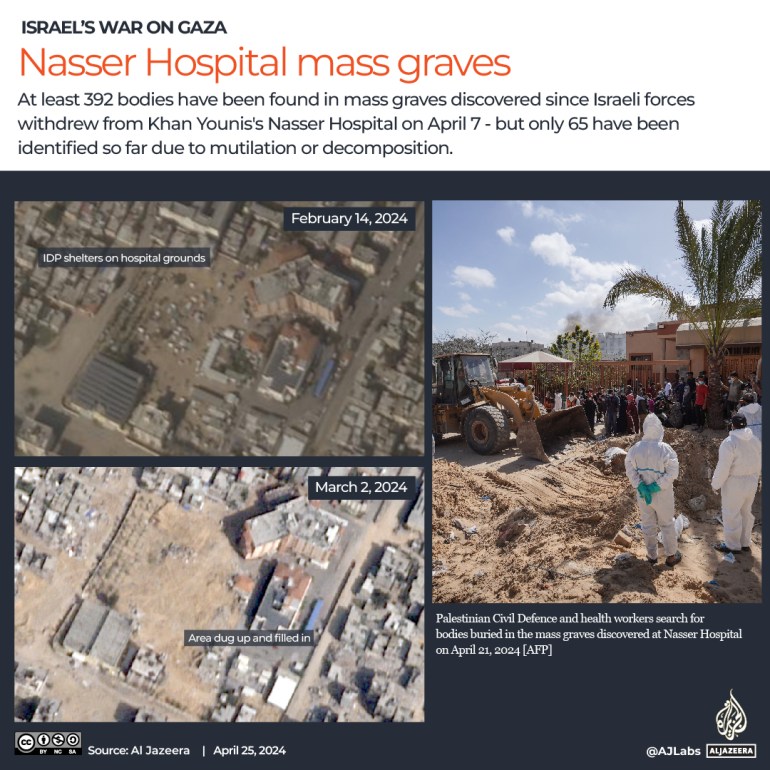Evidence of torture as nearly 400 bodies found in Gaza mass graves
Some victims found at two hospitals were ‘buried alive’ while others were ‘executed’ by the Israeli military.

Mass graves found in two hospitals in the Gaza Strip containing 392 bodies, including those of women, children and the elderly, showed signs of torture and executions, officials in the enclave have said.
On the sixth consecutive day of digging up bodies in southern Gaza, Palestinian Civil Defence officials on Thursday revealed horrifying new details about the mass graves around the Nasser and al-Shifa hospitals.
Keep reading
list of 4 itemsIsraeli attack kills 10, mostly children, in Gaza’s Rafah
Israeli siege turns Gaza’s Nasser Hospital into ‘a place of death’
‘Catastrophic situation’ at Gaza’s Nasser Hospital amid Israeli raid
Ten of the bodies were found with bound hands while others still had medical tubes attached to them, indicating they may have been buried alive, said civil defence member Mohammed Mughier.
“We need forensic examination for approximately 20 bodies for people who we think were buried alive,” Mughier said.
Yamen Abu Sulaiman, the head of the civil defence department in southern Khan Younis where Nasser Hospital is located, said three separate mass graves were found at the facility – one behind the morgue, one in front of the morgue, and one near the dialysis building.
Only 65 bodies have been identified by relatives of 392 recovered due to decomposition, mutilation and torture, or other difficulties, he said, adding that bodies were “stacked together” and showed indications of field executions having taken place.
At a news conference in southern Rafah on Thursday, Abu Sulaiman called on the international community to exert pressure to “put an immediate end to this aggression against our people”, as well as for humanitarian organisations and international media to be let into Gaza to “examine these crimes”.
Mughier, who provided photographic and video evidence of the remains of children, said “why do we have children in mass graves?”, adding that the evidence shows Israeli soldiers committed “crimes against humanity”.

The United Nations human rights chief, Volker Turk, called for an “independent, effective and transparent investigations” into the deaths.
“Hospitals are entitled to very special protection under international humanitarian law, and the intentional killing of civilians, detainees and others who are hors de combat is a war crime,” Turk said this week.
“We want answers. We want to see this thoroughly and transparently investigated,” US National Security Advisor Jake Sullivan told reporters.
Israeli army spokesman Major Nadav Shoshani claimed the graves at Nasser Hospital were “dug by Gazans a few months ago”. The Israeli military has also confirmed digging up bodies from graves, but in a stated effort to look for captives still held in the enclave.
Reporting from Washington, DC, Al Jazeera’s Heidi Zhou-Castro pointed out that Sullivan did not call for an “independent” investigation, meaning that the United States is content with Israel looking into the matter.
“That is the major difference between the US’s call for an investigation into the mass graves compared to that of other world leaders and of the UN High Commissioner [for human rights],” she said.
Zhou-Castro said accountability stays even further out of reach.
“So as far as condemnation, sure, there is more of that happening now in the US. As far as action, there is only action in support of Israel.”
US President Joe Biden on Wednesday signed into law a $94bn foreign funding bill that will provide Israel with $17bn in additional aid despite growing international calls to restrict US assistance to the Israeli military, which has killed more than 34,000 Palestinians in Gaza.
“This is a new level of criminality that I thought the Israelis were too smart to get involved with,” said Marwan Bishara, Al Jazeera’s senior political analyst.
“The ugliness and the tragedy of the scenes and the mindset behind it – done by the Israelis against the hospital, against the refugee camp – is something that we have never seen before and that is something that is going to stay with us for a while,” he added.